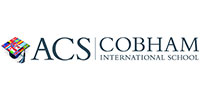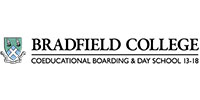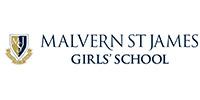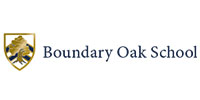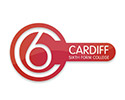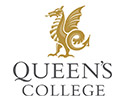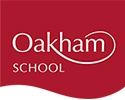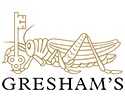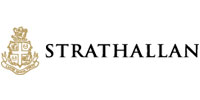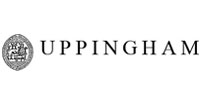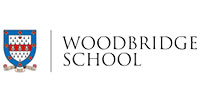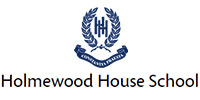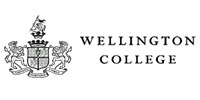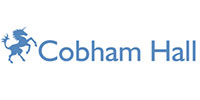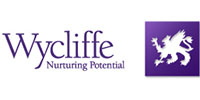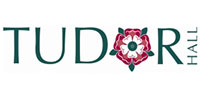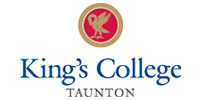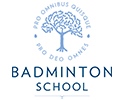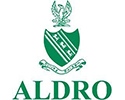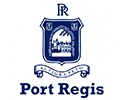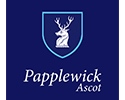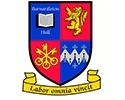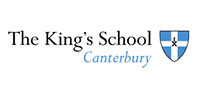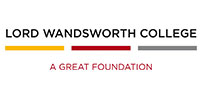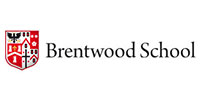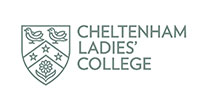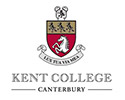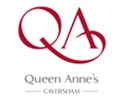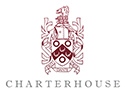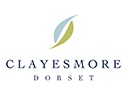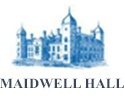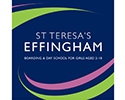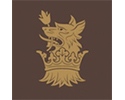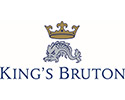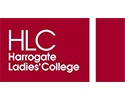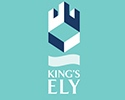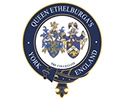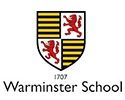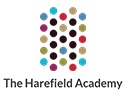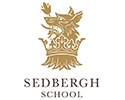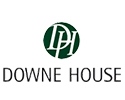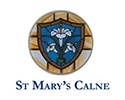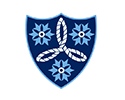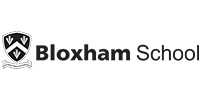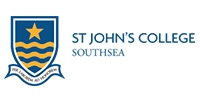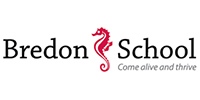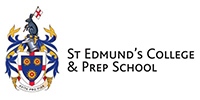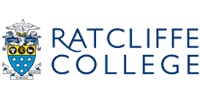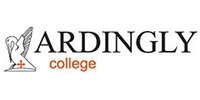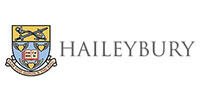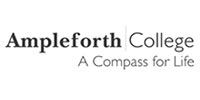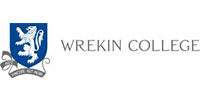This is a guide to help you create the perfect Student Profile.
A well thought out and detailed Student Profile will make more of an impression on the schools, improving the student’s chances of a suitable placement.
- You do not have to complete a Student Profile all at once. You can save it and return to edit it at any time.
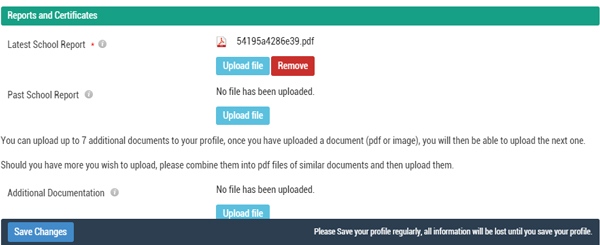
Save any time and return to complete the profile later.
- Complete all relevant fields. The more information available to the schools the better.
- There are instructions available for each section to guide you.
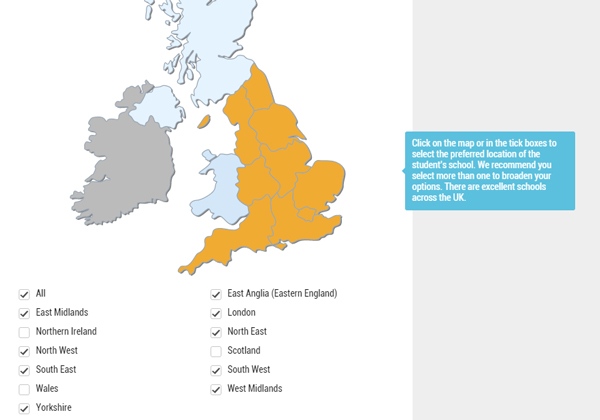
Example of guidance text
- Only when you click ‘Profile Complete’ at the end of the Student Profile will it be sent out to schools.
Documents
Here is a list of the documents you will need to complete a profile. All documents should be saved as PDF files so they can be uploaded to the student’s profile. All documents must be translated in to English:
- Last 2 school reports
- Any letters of recommendation or certificates (Please scan all these documents together and save as a .PDF)
- A headshot photograph of the student
- UKiset Parent Report (if available – further information – www.ukiset.com)
- Educational Psychologist’s report (if available)
Additional Information required
You will need the following personal information to complete all mandatory fields in the profile:
- Date of Birth
- Full name as seen on passport or ID card
- Desired locations of school
- Type of school
- Entry Year and start date
- Student’s Personal Statement (this can be copied and pasted into their profile)
- Interests and Hobbies
- Student’s strengths and weaknesses
- Student’s level of English and CEFR level or IELTS score if available
- Course/Qualification choice (IGCSE, A-Level, IB etc)
- Chosen subjects for Year 10-12 (if decided yet)
- Languages studied and spoken
- Recent grades in English, maths and science (A-E) if available
Personal Statement
A student’s personal statement is as important as their academic grades and achievements when applying to a British boarding school.
A personal statement should give the schools a good insight in to who they are and what they are looking to achieve by coming to school in the UK.
Selective schools will only consider high achieving students. They will then use the personal statements to decide which of these students will bring added value to their school’s community.
For non-selective schools personal statements are sometimes more important than grades because the schools will work hard to support the right child academically.
Examples of topics to include in a personal statement :
- Personality traits, character, likes/dislikes
- Hobbies and interests (sport, fashion, politics, travel etc)
- Ambitions/Future aspirations (what they aim to achieve in school and/or as a future career)
- Any achievements and/or awards they are proud of
- Why a school should consider them (what they will bring to the school’s community)
A Personal Video
Which British School allows students to record a video, which is attached to their profile.
The video can be used to demonstrate specific musical, sporting or artistic talents, which will aide any students wishing to apply for a scholarship. It can be of the student reading out their personal statement or a story, they could be doing a magic trick or someone could be interviewing them. They must simply be speaking in English in front of the camera. Videos should be no longer than 3-4 minutes long.
Some schools may only wish to receive profiles from students that have a video attached.
Recording a personal video directly on to WBS:
(This function uses YouTube. If you live in a country that does not permit access to YouTube please go to the next section on ‘Recording a video on to your phone, tablet or other computer’ below.)
Follow this link for a step by step guide and information on the videos security and hosting site Personal Video Information
Recording a Personal Video on a phone, tablet or other computer:
- Record the video and upload to a hosting website such as Youtube, Vimeo, YouKu, PandoraTV, Mail.RU, MyVideo or other local host in your country.
- Copy the URL and paste it in to the correct field under the Personal Video on the student’s profile.
Some schools have strong English language support departments and others require students to speak the same English as their British counterparts. If a student’s English is not strong enough for them to cope with the fast paced life of certain schools then it may be an option for them to attend a language course before being considered by these schools.
The Which British School personal video enables schools to make these decisions. If a student has strong academic grades and excels in other areas a school may offer them a place on the condition they attend an intensive English language course first.
Subjects
It will help schools if they can see which subjects a student entering in to Years 10-13 is interested in studying. If this decision has not been made yet then you can leave this section blank.
Year of Entry
You are required to enter the relevant Year in which the student will start at the school. You will find this information in the table below:
Year of Entry – student’s age when they start their new school
- Year 3 – 7 years old
- Year 4 – 8 years old
- Year 5 – 9 years old
- Year 6 – 10 years old
- Year 7 – 11 years old
- Year 8 – 12 years old
- Year 9 – 13 years old
- Year 10 – 14 years old
- Year 11 – 15 years old
- Year 12 – 16 years old
- Year 13 – 17/18 years old
Some schools will consider students that are slightly older than the entry year they wish to start in. For example if a student is 17 and they wish to come to the UK to study A-Levels some schools will allow them to enter into Year 12. This decision is made at the school’s discretion.
Course Level
When a student enters Years 10, 11 and 12 there is a choice of the type of course they wish to study. Not all schools offer all courses. If you are unsure as to which course is preferred when completing the profile please select all relevant courses so that the student’s profile is sent to all schools for consideration.
- Course Level – (relevant Year of Entry)
- Key Stage 2 – 3 (Year 3 – Year 6)
- Key Stage 3 (Year 7 – Year 9)
- 2-year GCSE (Year 10)
- 2-year IGSCE (Year 10)
- 1-year GCSE (Year 11)
- 1-year IGCSE (Year 11)
- Pre A-Level (Year 11)
- Pre-IB Diploma (Year 11)
- A-level (Year 12)
- Highers (Scottish)
- International Baccalaureate (IB) (Year 12)
- IB Primary Years Programme (IBPYP) (Year 3 – Year 7)
- IB Middle Years Programme (IBMYP) (Year 7 – Year 11)
- IB Career-Related Programme (IBCP) (Year 12)
- IB Diploma Programme (IBDP) (Year 12)
- Cambridge Pre-U (Year 12)
- BTEC (Year 11 – Year 12)
- English Language Course (Any Year)
- Advanced Placement (AP) (Year 10 – Year 12)
- Advanced Placement Capstone Diploma (APCD) (Year 12)
- Advanced Placement International Diploma (APID) (Year 12)
- US High School Diploma (Year 10 – Year 12)
Special Needs
Which British School will put you in direct contact with schools that can support a child with learning difficulties. British boarding schools pride themselves on the pastoral care they provide for their students. This care stems beyond the boarding houses and into the classroom where extra support is readily available for students with Special Educational Needs (SEN). Many schools have a dedicated SEN co-ordinator who is there to ensure students get the extra support they need.
If you know what the child’s learning difficulties are you can enter them on their profile . Please upload the child’s Educational Psychologist’s report if it is available.
If you are aware the child has learning difficulties but they have not yet been assessed you can select the type of learning difficulties the child has. The schools will then discuss these with you further.
You can read further information by clicking on this link to the UK Government website:
School Location
If you do not need to find a school in a specific location we recommend you select several, if not all locations on the Which British School map. The wider your search, the higher the chances are of finding the perfect school.
Academic achievements – VERY IMPORTANT SECTION
You are required to enter the student’s latest school grades in English, Maths and Science if they are entering Years 10-13. The grades you enter must be visible on the student’s latest school report. If the student’s school does not provide grades A-F then you can leave this section blank but you MUST provide legible school reports that offer the schools a clear understanding of the student’s academic achievement over the last year.
UKiset
UKiset is the UK independent school entry test. It can be taken at a number of test centres around the world. UKiset is for international students wanting to enter a British boarding school. The results provide schools with a standardised global score, which assists them with their assessment of the child’s suitability and academic capabilities. Some schools will only consider students that have taken UKiset and it will be a part of their entrance requirements. So if you are a not a British student we highly recommend you take the test before starting your profile otherwise it may not reach certain schools . Go to www.ukiset.com for more information, or click here to register for UKiset
English Level
You MUST enter the student’s level of English (beginners, elementary, intermediate, advanced). If you do not their profile will not be delivered to any schools.
English as a second language students entering Years 10-13 will be required to have either their CEFR level (Common European Framework Level) or their IELTS score. When a student has taken a Cambridge English Test of varying sorts they will have been given a CEFR level . Some schools will only consider students with a CEFR level.
To arrange an IELTS test visit – www.ielts.com. If a student has a CEFR level they do not have to take IELTS.
Interests, Hobbies, Sports and Music
British boarding schools offer a vast array of extra-curricular activities. The opportunities available to students is outstanding and schools will be looking for students that will make the most of the activities available to them.
When completing the student’s profile be sure to list sports and instruments they play now and those they are keen to play when they start their new school.
Detail a student’s interests and hobbies including any they would like to take up when they come to the UK.
